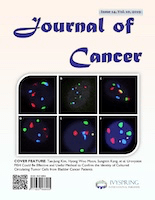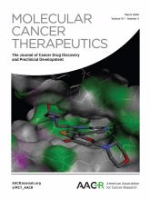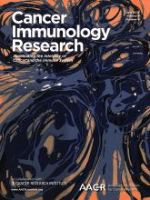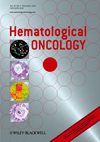
Cancer Communications
Scope & Guideline
Innovating Cancer Research for a Healthier Tomorrow
Introduction
Aims and Scopes
- Cancer Immunology and Immunotherapy:
Research focused on the immune system's role in cancer, including mechanisms of tumor immune evasion, development of immune checkpoint inhibitors, and novel immunotherapeutic strategies. - Molecular and Cellular Biology of Cancer:
Studies investigating the genetic, epigenetic, and metabolic changes that drive cancer initiation and progression, including the role of specific genes, proteins, and pathways. - Clinical Trials and Treatment Strategies:
Reports on the design, results, and implications of clinical trials for new cancer therapies, including novel drug combinations, targeted therapies, and personalized medicine approaches. - Cancer Microenvironment and Metastasis:
Exploration of the tumor microenvironment's influence on cancer progression, metastasis, and therapeutic response, including the roles of stromal cells, immune cells, and extracellular matrix components. - Translational Research and Biomarkers:
Research aimed at bridging laboratory findings to clinical applications, including the identification of biomarkers for cancer diagnosis, prognosis, and treatment response. - Cancer Prevention and Epidemiology:
Studies addressing lifestyle factors, genetic susceptibility, and preventive strategies for cancer, alongside epidemiological trends and their implications for public health.
Trending and Emerging
- Integration of Artificial Intelligence in Cancer Research:
There is a growing trend towards utilizing AI and machine learning techniques to enhance cancer diagnosis, predict treatment outcomes, and personalize therapy, reflecting the increasing importance of computational methods in oncology. - Focus on Tumor Microbiome Interactions:
Recent studies have begun to elucidate the role of the microbiome in tumorigenesis and treatment response, indicating an emerging interest in the complex interactions between gut flora and cancer biology. - Metabolic Reprogramming in Cancer:
Research on how cancer cells alter their metabolism to support growth and survival is on the rise, emphasizing the importance of metabolic pathways as potential therapeutic targets. - Personalized and Precision Medicine:
There is a clear shift towards personalized treatment strategies based on genetic profiling and biomarker identification, highlighting the movement away from one-size-fits-all approaches in cancer therapy. - Role of Non-Coding RNAs in Cancer:
The investigation of non-coding RNAs, including long non-coding RNAs and microRNAs, in regulating cancer progression and therapy resistance is gaining momentum, reflecting an expanding understanding of gene regulation in oncology.
Declining or Waning
- Traditional Chemotherapy Resistance Mechanisms:
While the exploration of resistance mechanisms to traditional chemotherapy remains important, there has been a noticeable shift towards understanding resistance to newer targeted therapies and immunotherapeutics, indicating a waning interest in conventional approaches. - Basic Research on Tumor Angiogenesis:
Although angiogenesis remains a critical area of cancer research, recent publications have increasingly focused on the interplay between the immune system and tumors, leading to a decrease in papers specifically centered on angiogenesis alone. - Single-Agent Therapy Studies:
Research focused solely on single-agent therapies is declining as the field moves towards combination therapies that incorporate immunotherapy and targeted treatments, reflecting a change in clinical practice and research priorities.
Similar Journals

Cancer Research Communications
Empowering global collaboration in cancer research.Cancer Research Communications is an esteemed journal published by the American Association for Cancer Research, a leading organization in the field of oncology. This journal aims to advance knowledge in cancer research through the dissemination of high-quality, peer-reviewed articles that cover a wide range of topics related to cancer biology, treatment modalities, and prevention strategies. As an open-access journal, Cancer Research Communications ensures that vital research findings are accessible to a global audience, promoting collaboration and innovation within the scientific community. The journal serves as a crucial platform for researchers, professionals, and students to share their insights and foster the exchange of effective cancer therapies and methodologies. With a commitment to excellence, it plays a significant role in shaping the future of cancer research and therapeutic development.

JOURNAL OF EXPERIMENTAL & CLINICAL CANCER RESEARCH
Fostering collaboration for groundbreaking cancer discoveries.The JOURNAL OF EXPERIMENTAL & CLINICAL CANCER RESEARCH, published by BMC, is a leading open-access journal dedicated to advancing the field of cancer research and oncology. Since its inception in 1982, this esteemed journal has fostered innovation and collaboration in the scientific community, as evidenced by its outstanding impact factor and position in the Q1 quartile for both Cancer Research and Oncology categories in 2023. With a proud commitment to disseminating high-quality research, the journal operates under an open-access model, ensuring that findings are readily accessible to researchers, healthcare professionals, and students worldwide. The journal has established a distinguished reputation, ranking 23rd out of 404 in Medicine oncology and 16th out of 230 in Biochemistry, Genetics, and Molecular Biology (cancer research), showcasing its importance and influence in guiding the future of cancer treatment and research. With the aim of bridging experimental and clinical research, this journal invites submissions that push the boundaries of our understanding of cancer biology and therapy.

NEOPLASMA
Connecting Researchers for a Cancer-Free FutureNEOPLASMA is a prominent journal published by AEPRESS SRO, dedicated to the multifaceted field of oncology and cancer research. Since its inception in 1957, this esteemed publication has served as a vital platform for advancing the understanding of neoplastic diseases, disseminating high-quality research findings that contribute to clinical and laboratory advancements. Operating under a robust framework of peer review, NEOPLASMA holds significant credibility, as evidenced by its Q2 ranking in the Medicine (miscellaneous) category and Q3 rankings in both Cancer Research and Oncology for 2023. Furthermore, with an ISSN of 0028-2685 and E-ISSN 1338-4317, the journal fosters accessibility to valuable scientific content despite the absence of open access options. Positioned in Bratislava, Slovakia, NEOPLASMA continues to attract a global readership, making substantial contributions to the fields of biochemistry, genetics, and molecular biology as highlighted by its Scopus rankings. This journal is essential reading for researchers, professionals, and students looking to stay abreast of the latest developments in cancer research and treatment strategies.

Journal of Cancer
Championing open access to vital cancer research.Journal of Cancer is a premier, peer-reviewed academic journal published by IVYSPRING INTERNATIONAL PUBLISHING that focuses on advancing the field of oncology. With an impact factor reflecting its significant contributions, this journal ranks in the 80th percentile of medical journals pertaining to oncology, positioning it at #79 out of 404 in Scopus. Since its inception in 2010, the journal has embraced an Open Access model, ensuring that groundbreaking research reaches a global audience without barriers. Based in Australia, the journal addresses a wide array of topics within cancer research, catering to researchers, healthcare professionals, and students committed to enhancing their understanding of the complexities of cancer. Amidst evolving challenges in oncology, the Journal of Cancer serves as a vital platform for disseminating innovative findings, fostering collaboration, and promoting informed decisions that can lead to improved cancer outcomes worldwide.

MOLECULAR CANCER THERAPEUTICS
Transforming cancer care with cutting-edge research.MOLECULAR CANCER THERAPEUTICS, published by the American Association for Cancer Research, is a premier journal dedicated to advancing the field of cancer research and therapy since 2001. With a notable impact factor reflecting its high-quality content, this journal stands out in the Q1 category for both Cancer Research and Oncology as of 2023. Researchers, clinicians, and students interested in innovative treatment strategies and molecular mechanisms can find valuable insights within its pages, bolstered by a rigorous peer-review process and a global perspective on cancer therapeutic developments. Although the journal operates under a subscription model, it provides comprehensive access to cutting-edge studies and reviews that drive forward the understanding of cancer biology and treatment modalities. The journal's impressive Scopus rankings further validate its influence within both oncology and the broader cancer research community, making it an indispensable resource for anyone committed to combating cancer through science.

Cancer Immunology Research
Advancing the Frontiers of Cancer ImmunologyCancer Immunology Research is a leading journal dedicated to the rapidly evolving field of cancer immunology, published by the American Association for Cancer Research. Established in 2013, this prestigious journal has quickly made a significant impact in its domain, achieving a 2023 Q1 ranking in both Cancer Research and Immunology. With an impressive Scopus rank of 24 out of 230 in cancer research and 28 out of 236 in immunology, it occupies a valuable position for researchers, professionals, and students engaged in cutting-edge cancer studies. Although it does not offer open access, the journal is committed to disseminating high-quality, peer-reviewed research that advances our understanding of the immune system’s role in cancer. The journal's objectives include fostering innovative studies, enhancing collaboration across disciplines, and promoting the translation of research findings into clinical applications, making it a vital resource for anyone invested in cancer therapy and immunological research.

BRITISH JOURNAL OF CANCER
Shaping the Future of Oncology Through Quality Scholarship.The British Journal of Cancer, published by SpringerNature, stands as a preeminent resource in the fields of Cancer Research and Oncology, with a distinguished history of publication dating back to 1947. With its Q1 rank in both categories for 2023, this journal is among the top-tier publications, offering cutting-edge research and insights into the biology, etiology, and treatment of cancer. The journal’s rigorous peer-review process ensures that readers are presented with high-quality studies that contribute to the advancement of cancer knowledge and clinical practice. Operating from the United Kingdom, it has garnered a notable impact factor and ranks impressively within Scopus, making it an essential publication for researchers, healthcare professionals, and students who are dedicated to understanding cancer's complexities. Access to the journal's articles is available in traditional formats, providing a versatile platform for disseminating pivotal research. As we move towards a future where cancer treatment and prevention remain crucial, the British Journal of Cancer continues to play a vital role in shaping the dialogue and discoveries within the oncology community.

HEMATOLOGICAL ONCOLOGY
Transforming Knowledge into Practice in Hematological OncologyHEMATOLOGICAL ONCOLOGY, published by Wiley, is a premier journal in the fields of cancer research, hematology, and oncology, with a rich history of publication dating back to 1983. With an impact factor indicative of its influential standing—ranking in the second quartile in multiple categories including Cancer Research, Hematology, and Oncology—this journal serves as a vital resource for researchers, clinicians, and students alike. HEMATOLOGICAL ONCOLOGY is based in the United Kingdom and focuses on the advancements and challenges in the understanding and treatment of hematological malignancies. While it does not offer open access options, its rigorous peer-review process ensures that all published articles are of the highest quality, contributing to the ongoing dialogue and research in this critical area of medicine. With its commitment to disseminating impactful research, HEMATOLOGICAL ONCOLOGY remains an essential platform for driving innovation and collaboration within the global scientific community.

BIOCHIMICA ET BIOPHYSICA ACTA-REVIEWS ON CANCER
Transforming Cancer Knowledge into Impactful SolutionsBIOCHIMICA ET BIOPHYSICA ACTA-REVIEWS ON CANCER, published by Elsevier, has established itself as a leading journal in the domains of cancer research, genetics, and oncology, holding a prestigious position in the Q1 quartile rankings in these fields as of 2023. With an ISSN of 0304-419X and an E-ISSN of 1879-2561, this journal aims to disseminate high-quality, impactful reviews that synthesize the latest advancements and findings in cancer biology, treatment modalities, and genomic studies. Its robust indexing and remarkable Scopus rankings—placing it in the 95th to 91st percentiles across various categories—underline its significance for researchers, clinicians, and students passionate about oncology. Operating from its Netherlands headquarters, BIOCHIMICA ET BIOPHYSICA ACTA-REVIEWS ON CANCER is dedicated to fostering a comprehensive understanding of the complex biological mechanisms underlying cancer, promoting innovative therapeutic strategies, and guiding future research directions.

Molecular Cancer
Advancing cancer research for a healthier tomorrow.Molecular Cancer, published by BMC, stands as a premier open access journal dedicated to advancing our understanding of cancer biology, treatment, and prevention since its inception in 2002. With an impressive Q1 ranking in the domains of Cancer Research, Molecular Medicine, and Oncology, this journal occupies a significant position in the academic landscape, emphasizing high-quality research that influences clinical practices and future studies. The journal is indexed in leading databases with exceptional Scopus ranks, reflecting its rigorous peer-review process and impactful contributions to the field, where it ranks in the top 2-3 positions across various relevant categories. Based in the United Kingdom, Molecular Cancer offers researchers worldwide a valuable platform for disseminating innovative findings that drive the biomedical community forward. The journal's open access model ensures that groundbreaking research is freely accessible, fostering collaboration and knowledge sharing among professionals, students, and academics alike. Explore cutting-edge developments in cancer research through Molecular Cancer and join a community committed to improving patient outcomes and advancing scientific discovery.